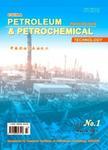Effect of Operating Parameters on Composition of Dry Gas Obtained During Gasoline Cracking Process
Effect of Operating Parameters on Composition of Dry Gas Obtained During Gasoline Cracking Process作者机构:Research Institute of Petroleum Processing SINOPEC Beijing 100083 China
出 版 物:《China Petroleum Processing & Petrochemical Technology》 (中国炼油与石油化工(英文版))
年 卷 期:2010年第12卷第3期
页 面:1-5页
核心收录:
学科分类:081705[工学-工业催化] 08[工学] 0817[工学-化学工程与技术]
主 题:gasoline operating parameters catalytic cracking dry gas ethylene
摘 要:The influence of operating parameters on ethylene content in dry gas obtained during catalytic cracking of gasoline was investigated in a pilot fixed fluidized bed reactor in the presence of the MMC-2 catalyst. The results have shown that the majority of dry gas was formed during the catalytic cracking reaction of gasoline, with a small proportion of dry gas being formed through the thermal cracking reaction of gasoline. The ethylene content in dry gas formed during the catalytic cracking reaction was higher than that in dry gas formed during the thermal cracking reaction. The ethylene content in dry gas formed during catalytic cracking of gasoline with a higher olefin content was higher than that in dry gas formed during catalytic cracking of gasoline with a lower olefin content, which meant that the higher the amount of carbonium ions was produced during the reaction, the higher the ethylene content in the dry gas would be. An increasing reaction temperature could increase the percentage of dry gas formed during thermal cracking reaction in total dry gas products, leading to decreased ethylene content in the dry gas. An increasing catalyst/oil ratio could be conducive to the catalytic cracking reactions taking place inside the zeolite Y, leading to a decreased ethylene content in the dry gas. A decreasing space velocity could be conducive to the catalytic cracking reactions taking place inside the shape-selective zeolite, leading to increased ethylene content in the dry gas.



